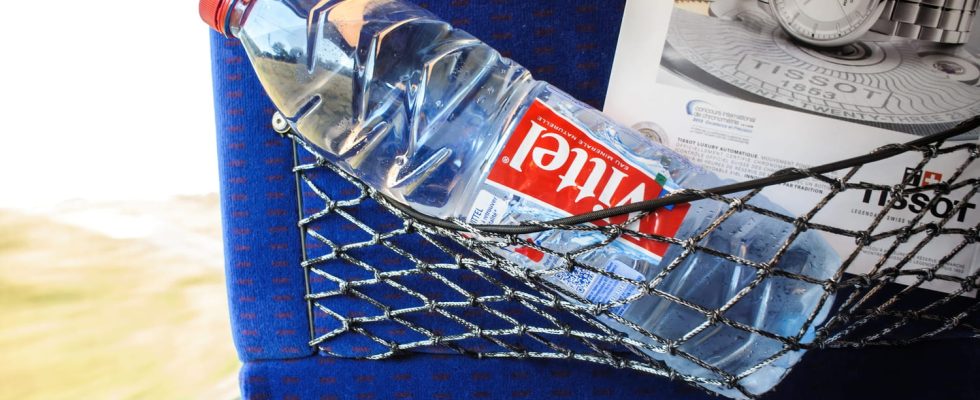An ANSES report reveals the contamination of several mineral waters marketed by the French group Nestlé.
Panic at Nestlé. On Thursday April 4, The world And franceinfo revealed the results of a confidential report carried out by the Food Safety Agency (ANSES) reporting widespread contamination to bacteria and chemical contaminants waters exploited by the group Nestlé in France. Brand waters Perrier, Hépar, Vittel or Contrex are concerned. The expertise, transmitted to the government in October 2023, indicates that health quality would not be “guaranteed” to consumers. What is really wrong with Nestlé waters? What are the risks if we drink? Summary and issues of this health scandal.
Alert starting point
► In December 2020: a former employee of the Alma group (Cristalline, Châteldon, St-Yorre, Vichy Célestins, etc.) launches an alert and triggers an investigation by the Directorate General for Competition, Consumer Affairs and Fraud Control (DGCCRF) into practices of French bottled water producers. During the investigation, fraud repression makes another discovery : the Alma group would be far from being the only one to use prohibited treatments. By analyzing filter supplier files, investigators discover among the customers’ names that of Nestlé Waters.
► In June 2023: the director of theARS Occitanie, Didier Jaffre, requests the services of Anses “in view of the vulnerability” of the water resources of the Vergèze site, where Perrier® water (Nestlé group) is produced. Same thing for the director of ARS Grand Est where Hépar®, Vittel® and Contrex® waters are produced in Arches (Vosges). In their letter, the regional health agencies mention “the presence of prohibited treatments” in two bottling plants, “the presence of micropollutants” and “a regular contamination raw water on at least 5 of the 7 boreholes”.
► In October 2023: after an investigation carried out by the Nancy hydrology laboratory, ANSES experts submitted their conclusions to the ministry, specifying that they had only had access to “truncated and fragmented” information to carry out their expertise.
The note points to the use of prohibited treatments on mineral water such as ultraviolet light and activated carbon filters.
Despite everything, their conclusions are clear and confirm the alerts previously issued: the note points to regular contaminations with bacteria and the presence of chemical contaminants, but also the use of prohibited treatments on mineral waters such as ultraviolet and activated carbon filters. The non-conformity of the waters therefore reveals “insufficient level of trust” not being able to “guarantee the health quality of finished products”, in other words, natural mineral waters marketed by the Nestlé group. ANSES recommends to the Ministry of Health a “reinforced surveillance plan” considering that these anomalies “should not lead to the production of bottled water” in these sources, writes ANSES.
► Today : despite the recommendations of health authorities, Nestlé appears to continue to exploit contaminated sources to produce natural mineral water. Contacted by franceinfo, the group repeats that the quality of its water complies with regulations and ensures that it has removed the other illicit treatments (activated carbon and ultraviolet filters) put in place in recent years and which are nevertheless necessary to ensure effective disinfection. some water.
What is wrong with Nestlé waters?
Two major problems are raised:
- the Anses note reports regular microbiological contamination of “fecal origin” with coliform bacteria, type Escherichia coli or intestinal enterococci on numerous drillings “capable of reaching high concentrations” while the regulations on natural mineral waters do not tolerate the presence of any bacteria in the water, whether before or after bottling.
- the report reveals the presence of Pfas (per- and polyfluoroalkyl substances), so-called “eternal” pollutants massively used by industry, as well as pesticides and their degradation products, the sum of which can, for certain catchments, “exceed 0.1 micrograms per liter”i.e. the regulatory threshold for natural mineral water.
A surprising coincidence of timing because a project aimed at restricting the manufacture and sale of products which contain Pfas must be examined this Thursday, April 4 in the National Assembly.
What are the waters of the Nestlé group?
According to their website, the Nestlé Waters group owns the waters:
- Vittel®
- Perrier® (and Perrier Fines Bulles)
- Contrex®
- Hépar®
The Nestlé group also owns the brands San Pellegrino®Acqua Panna®Nestlé Pure Life®, but for the moment, ANSES has not indicated whether these waters were affected by this contamination.
What health risk for the consumer?
Opinions differ. The Ministry of the Economy assures that“no health risk linked to the quality of bottled water has been identified at this stage”. “Health risk appears to be supported“, insists Ingrid Kragl, director of information within the Foodwatch association, on BFMTV.‘General Inspectorate of Social Affairs (Igas) is more nuanced: if “globally”THE “level of compliance is high on bottled waters, it would not be prudent to conclude to perfect control of health risksparticularly microbiological risk [….] L“treatments implemented” having been for “compensate for a defect in the quality of the resource, their withdrawal is likely to cause a health risk“.
